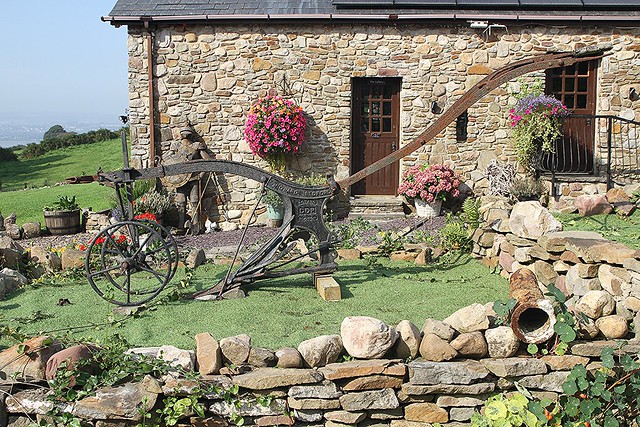Words for plough* and related things in Celtic languages.
*plough = plow for those of you in North America.
Words marked with a * are reconstructions.
| Proto-Celtic | *aratrom = plough |
|---|---|
| Old Irish (Goídelc) | arathar = plough, ploughing equipment, tillage airid = to plough airem = ploughman |
| Middle Irish (Gaoidhealg) | arathar = plough, ploughing equipment, tillage airem = ploughman, tiller airid = to plough, till airithe = ploughed |
| Irish (Gaeilge) | arathar = ploughing equipment, plough, ploughing (literary) air = plough (literary) |
| Scottish Gaelic (Gàidhlig) | àrach [aːrəx] = ploughshare, utensils for ploughing (archaic) |
| Manx (Gaelg) | erroo = ploughman, tiller of land errooid = cultivation, tillage, ploughmanship |
| Proto-Brythonic | *aradr [aˈradr] = plough |
| Middle Welsh (Kymraec) | aratrum, aradyr, aradr, aratr = plough aradrur, aradrwr = ploughman aradỽy, aradwy = arable or ploughed land |
| Welsh (Cymraeg) | aradr [ˈaradr/ˈaːradr] = plough, the Plough aradraf, aradu = to plough, till, cultivate aradrswch = ploughshare araduriaeth = (act of) ploughing, ploughmanship aradrwr = ploughman aradrwy = arable or ploughed land |
| Old Cornish | aradar = plough |
| Middle Cornish (Cernewec) | aradar, ardar, aratum = plough araderuur, arator = ploughmen aras = to plough, till |
| Cornish (Kernewek) | arader = plough araderor = ploughman aradow = arable aras = to plough |
| Middle Breton (Brezonec) | ararz, arazr = plough |
| Breton (Brezhoneg) | arar [ˈɑːrar] = plough aradeg = ploughing, ploughing competition aradenn = ploughing, surge of anger arat = to plough, spin |
Etymology: from Proto-Indo-European *h₂érh₃trom (plough), from *h₂erh₃- (to plough) and *-trom (instrumental suffix). Words from the same roots include ard (a simple plough consisting of a spike dragged through the soil) in English, arður (plough, profit, gain) in Icelandic, årder (plough) in Swedish, ader (plough) in Estonian and arado (plough) in Spanish [source].
| Proto-Celtic | *kanktus / *kanxtus = plough, plough beam |
|---|---|
| Old Irish (Goídelc) | cécht = plough-beam |
| Middle Irish (Gaoidhealg) | cécht, cecht = plough-beam, plough |
| Irish (Gaeilge) | céachta [ˈkeːx.t̪ˠə] = plough céachtaíl = ploughing céachtaire = ploughwright |
| Scottish Gaelic (Gàidhlig) | ceuchd = plough (obsolete) |
| Manx (Gaelg) | keeaght [ˈki.axt] = plough |
Etymology: from Proto-Celtic *kankā (branch), from Proto-Indo-European *ḱank- (branch). Words from the same roots include géag (branch, bough, limb) in Irish, cainc (branch) in Welsh, gancio (hook) in Italian, and gancho (hook, peg) in Spanish [source].
| Old Irish (Goídelc) | trebaid = to cultivate, till, plough, inhabit |
|---|---|
| Middle Irish (Gaoidhealg) | trebad = (act of) ploughing cultivating, husbandry trebaid = to cultivate, till, plough, inhabit, dwell |
| Irish (Gaeilge) | treabh [ˈtʲɾʲavˠ/ˈtʲɾʲəu] = to plough; till, cultivate, occupy, inhabit (literary) treabhadh = ploughing treabhdóir = ploughman |
| Scottish Gaelic (Gàidhlig) | treabh [tro] = to till (the ground), plough, cultivate, delve treabhadh = ploughing treabhta = ploughed, tilled, cultivated |
| Manx (Gaelg) | traaue = to plough (up), till, furrow, cleave, ploughing, tilling traauee = ploughing, contributing, to tillage traaueyder = ploughman |
Etymology: from Old Irish treb (house(hold), farm, tribe), from Proto-Celtic *trebā (dwelling), from Proto-Indo-European *treb- (dwelling, settlement) [source]. For more related words, see the post about Towns and Tribes.
| Middle Welsh (Kymraec) | gwyd, guyd = (wooden frame of a) plough |
|---|---|
| Welsh (Cymraeg) | gwŷdd [ɡwɨːð] = plough (North Wales), tree(s), branches, timber, masts, loom |
Sources: Wiktionary, Am Faclair Beag, Online Manx Dictionary, Teanglann.ie, eDIL – Electronic Dictionary of the Irish Language, In Dúil Bélrai English – Old Irish glossary, Geiriadur Prifysgol Cymru, Gerlyver Kernewek, Dictionaire Favereau, TermOfis, English – ProtoCeltic WordList (PDF), Etymological Dictionary Of Proto Celtic


